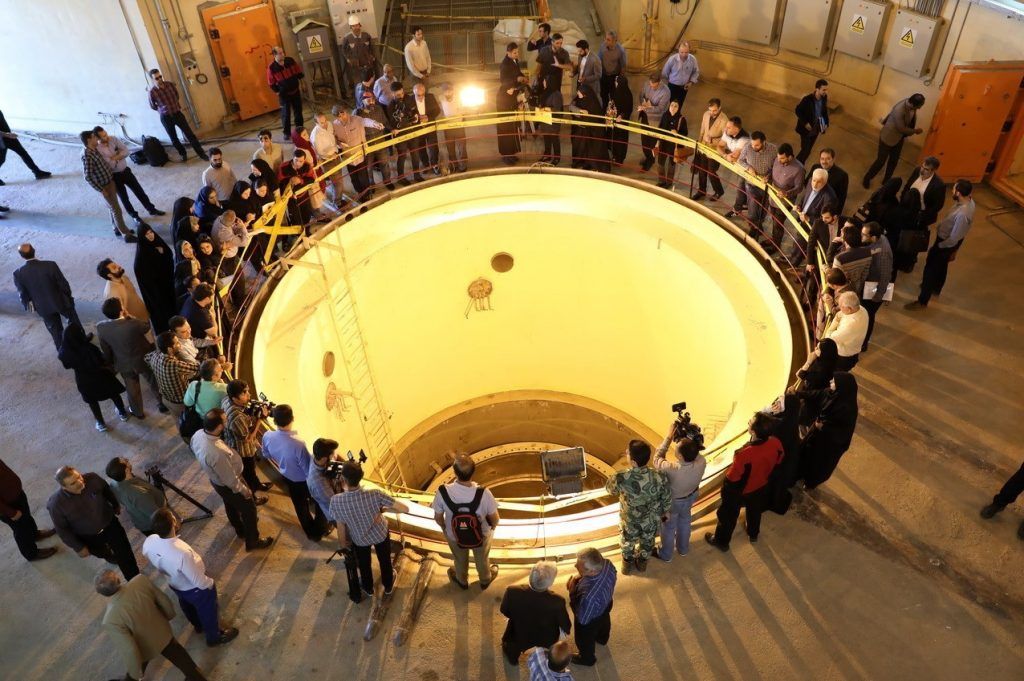Members of US Congress refuse to benefit from the Iran nuclear deal
By John Krzyzaniak | November 6, 2019
 Members of the press visit the Arak reactor, June 2019. Photo credit: Tasnim news.
Members of the press visit the Arak reactor, June 2019. Photo credit: Tasnim news.
Bucking a trend in its maximum pressure campaign, last week the Trump administration decided that it would renew sanctions waivers for Iran’s civil nuclear program. One of those waivers has allowed British and Chinese scientists to help Iran redesign the heavy water reactor at Arak to be used for peaceful purposes. Now, members of US Congress, including Senators Ted Cruz and Lindsey Graham as well as Representative Liz Cheney, want to bar the administration from renewing waivers for Arak in the future, which would effectively prevent the United States from reaping a key benefit from the nuclear deal. Apparently, those legislators don’t like having their cake and eating it too.
When Iran and the major world powers signed the Joint Comprehensive Plan of Action (JCPOA) in 2015, one of the stipulations was that the Arak reactor would be partially destroyed, redesigned, and rebuilt with the help and supervision of foreign experts.
Why was redesigning Arak important to the United States? A heavy water reactor takes natural uranium as its fuel. Once that fuel is burned up, plutonium can be extracted from it. So, the Arak reactor would have presented a major proliferation risk if it had become operational under its original design. It would have given Iran an alternative pathway to a nuclear bomb that did not involve uranium enrichment.
With the JCPOA, Iran agreed to remove and destroy part of the reactor core, called the calandria, which it did in early 2016. It also agreed to redesign the reactor to have a lower power capacity and to use low-enriched uranium instead of natural uranium as the fuel. These changes would reduce the amount of plutonium in the spent fuel to less than one kilogram per year, meaning the Arak reactor could never be used for a nuclear weapons program. It was a win for nonproliferation.
After some delays, the redesign has recently been moving ahead and even picking up pace. In July, the head of Iran’s Atomic Energy Organization, Ali Akbar Salehi, said, “The joint committee tasked with redesigning the Arak Heavy Water Reactor Facility—comprised of Iran, China and Britain—is performing its job well.” A delegation of British and Chinese experts visited Iran in October to continue with the project.
By trying to force the Trump administration to cancel the waiver for international collaboration on the project, members of US Congress want to deny the United States a major benefit of the nuclear deal by halting the very operation that would make the reactor proliferation-resistant.
Sanctioning the project would also raise the risk that Iran will revert to the original reactor design. In July, Iranian President Hassan Rouhani threatened just that, stating, “if you don’t operate [according to] the program and time frame of all the commitments you’ve given us, we will return the Arak reactor to its previous condition.”
His threat was not an empty one. In January, Salehi claimed that while Iran was negotiating the nuclear deal, it secretly imported a set of replacement tubes for the calandria: “When they told us to pour cement into the tubes, we did. . . . We said, ‘Fine. We will pour.’ But we did not tell them that we had other tubes. Otherwise, they would have told us to pour cement into those tubes as well.” These spare parts would enable Iran to make good on Rouhani’s threat.
Some have argued that Iran’s illicit procurement of replacement parts needs to be punished, and that suspending the waiver is a good way for Washington to do so. But that would amount to cutting off the nose to spite the face. Also, while the secret procurement does deserve to be punished, putting a halt to the redesign would only prove to Iran that it did the right thing, because the tubes may prove useful.
By contrast, allowing the conversion to proceed to its conclusion would teach Iran that their deception was a wasted effort. The replacement parts would then be useless for Arak, nor could they be used elsewhere: Iran does not have another heavy water reactor project in the works and is forbidden from building one under the JCPOA for 15 years.
It’s important to remember that the conversion of the Arak reactor was a demand made by the West. Even though the United States has withdrawn from the nuclear deal and has re-instated a far-reaching sanctions regime, it’s still deriving important nonproliferation benefits. Why throw them away?
Together, we make the world safer.
The Bulletin elevates expert voices above the noise. But as an independent nonprofit organization, our operations depend on the support of readers like you. Help us continue to deliver quality journalism that holds leaders accountable. Your support of our work at any level is important. In return, we promise our coverage will be understandable, influential, vigilant, solution-oriented, and fair-minded. Together we can make a difference.
Keywords: Arak, Iran nuclear deal, JCPOA, heavy water reactor, joint comprehensive plan of action, sanctions
Topics: Nuclear Risk, Opinion














